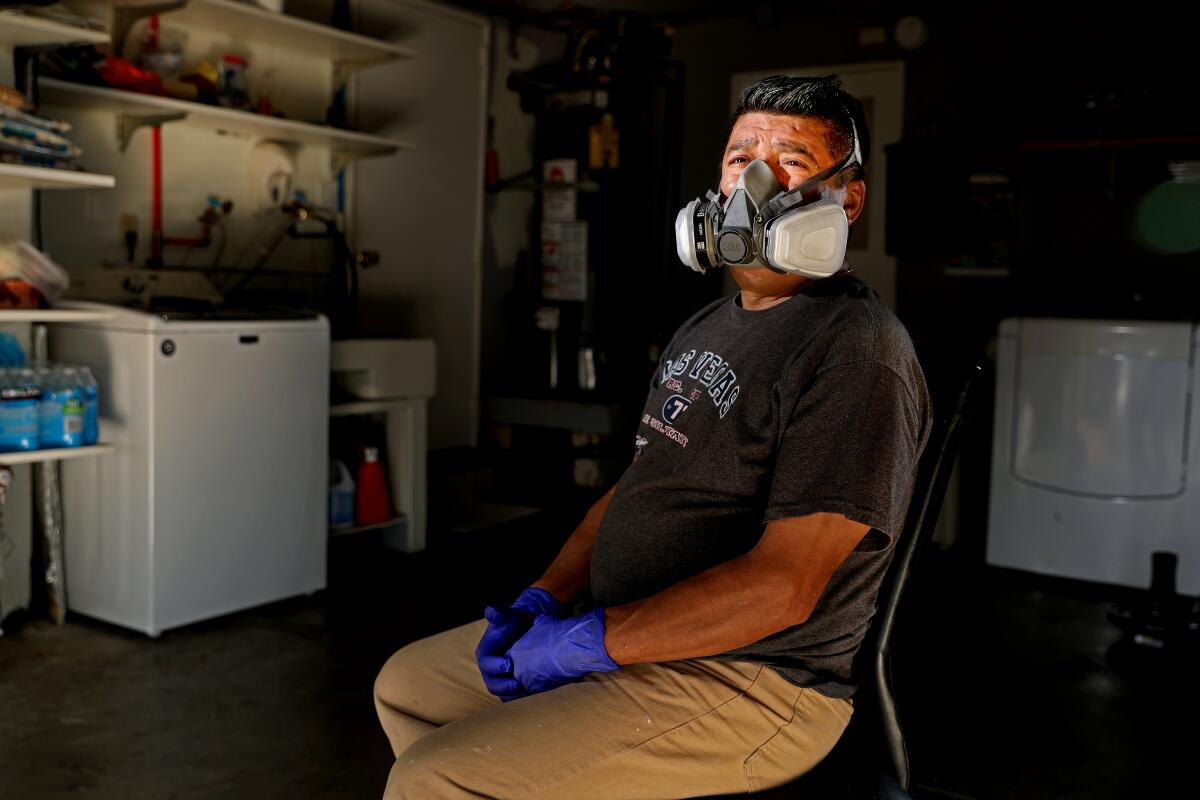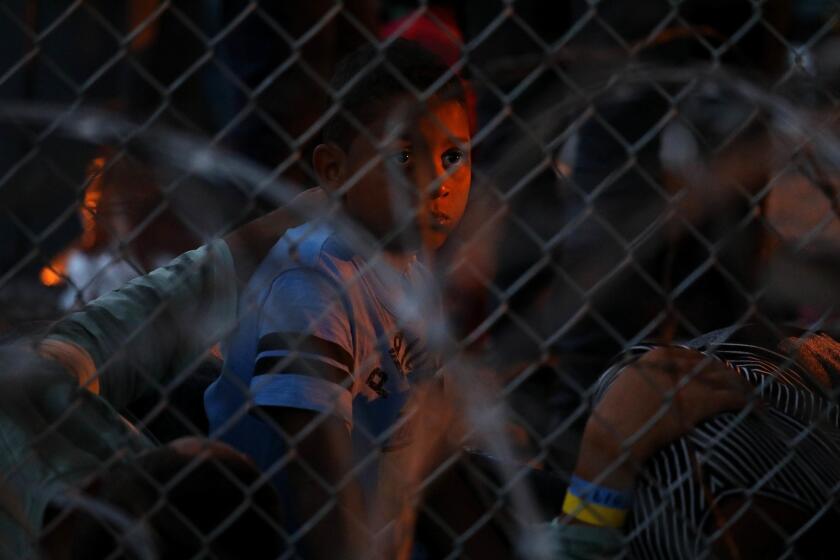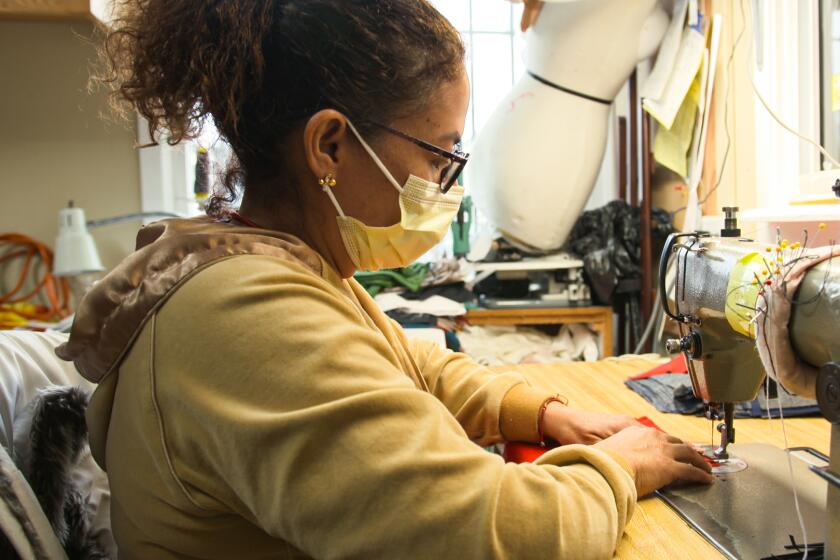He’s diabetic. He works a high-risk job. But to pay rent, he has no choice

- Share via
Any day now, Lopez may have to move into his garage to self-quarantine.
The Bay Area medical maintenance technician earns $27 an hour painting and repairing rooms and hallways in clinics and hospitals, a job that puts him at high risk for catching the novel coronavirus.
For the last few weeks, he has worked at a small medical facility for cancer patients where he believes the infection risk is lower. Though temporary, the job is a welcome change from where he worked until late March: a large Bay Area hospital teeming with COVID-19 patients. But Lopez agonizes about eventually having to return to that hospital.
“There just aren’t any options for someone in my situation,” said the 51-year-old migrant from Mexico, who lives in San Jose and is in the country illegally. He asked that his full identity, the name of the hospital, and his employer not be made public because he fears repercussions.
Lopez is diabetic, which puts him at high risk of suffering serious complications and dying if he contracts COVID-19. His wife, a housekeeper, is out of work because of the pandemic. He has bills to pay, a family to feed and $3,000 monthly rent. His lack of legal status shuts him out of the Trump administration’s pandemic relief efforts and makes him ineligible for California unemployment.
As a result, he and millions of other workers like him face a wrenching choice: financial ruin or risking their health and, possibly, their lives.
As the coronavirus pandemic grows, Americans are increasingly relying on low-wage workers to harvest crops, provide medical care, deliver food and perform other essential jobs. Many of these workers are in the country illegally, part of an estimated labor force of 7 million workers without legal status. At least 1 million are farmworkers.
Even as the need for these types of workers has increased during the pandemic, the White House has continued to push immigration policies that have virtually shut down the inflow of foreigners, particularly asylum seekers.
In April, President Trump signed a proclamation that blocks some foreigners who do not already have visas or other travel documents from entering the country. It includes broad exemptions for several categories of foreign workers and employers, from investors to healthcare professionals, as well as their spouses and children.
Despite paying billions in state and local taxes, many migrant workers deemed essential do not have valid Social Security numbers and are, therefore, blocked from receiving most federal financial assistance, including unemployment insurance and the cash payments provided as part of the government’s historic $2-trillion stimulus package enacted in late March.
The administration refuses to release migrant kids to ready sponsors, telling courts that custody is safer — even as it ramps up deportation efforts.
Immigrant rights advocates and other critics say that the Trump administration has refused to help these workers directly in any significant way during the pandemic, leaving many without a financial safety net afforded to most Americans.
“Immigrants are out there ensuring our economy continues to work,” said Javier Hernandez, director of the Inland Coalition for Immigrant Justice, which is made up of several nonprofit organizations that serve the immigrant community in the Inland Empire.
“In this moment of crisis, we are asking immigrants to put themselves at risk,” Hernandez continued. “Yet we are denying them their humanity, by saying, ‘You need to work, but we will not be able to take care of you when you need it.’ ”
In California, immigrants who are in the country illegally make up nearly 10% of the state’s workforce, according to 2017 data compiled by the Public Policy Institute of California. The 1.75 million unauthorized workers are overrepresented in providing essential services such as healthcare, food and construction.
Currently, immigrants in the country illegally who live in California can apply for state disability insurance, paid family leave and workers compensation if they lose their job because they are sick or quarantined.
In April, Gov. Gavin Newsom also announced a $125-million relief effort for immigrants without legal status impacted by the coronavirus. The proposal will offer $500 cash grants for individuals who are in the country illegally and up to $1,000 for families. The states opened up applications this week. The first day was chaotic with long delays, crashing websites and flooded phone lines.
Activists have scrambled to gather donations for their charity funds, but those resources are limited. In late April, the Long Beach Immigrant Rights Coalition received more than 200 submissions for small grants in the first three hours after opening applications to immigrant families.
Other nonprofit organizations, such as the National Domestic Workers Alliance and the Immigrant Neighbor Fund are still accepting applications for immigrant workers, but the grants are small, ranging between $400 and $500.
Many advocates and service providers say more needs to be done. They are pushing for Congress to pass the HEROES Act, a new $3-trillion coronavirus response bill introduced by Democrats that includes stimulus payments for all taxpayers, regardless of immigration status. It also would include COVID-19 testing, treatment and future vaccine coverage for all, including people in the country without legal status.
The proposal has been met with swift opposition by many Republicans and groups seeking to curb both legal and illegal immigration. Roy H. Beck, who heads Numbers USA, a powerful national advocacy group that advocates for restrictions on all immigration, called the bill “shameful.”
“Instead of focusing on helping 33 million unemployed Americans get back to work, the so-called Heroes Act uses the COVID-19 pandemic to give amnesty — and cash payments — to illegal foreign workers in the United States,” Beck said in a prepared statement.
As legislators hash out the bill, Lopez is making careful calculations.
Quitting his job is not an option. He and his family already have slimmed down many of their expenses. The family has cut most meat out of their diet because it is too expensive.
“We are trying to save every penny,” he said.
But it’s still not enough. He knows he will have to relent and go back to the hospital. He worries about catching the virus and giving it to his family. So he’s come up with something of a strategy.
“My plan one is to take my last two weeks of vacation,” he said. “My plan two is that I’ll have to move into the garage because I’ll have to go back to work, but I need to keep my family safe.”
For now, he protects himself as much as he can. He sports a painter’s mask, gloves, scrubs and hair cover whenever he enters the clinic. He’s meticulous about washing his hands. As soon as he gets home, he douses his hands in rubbing alcohol. He makes sure to strip off his scrubs and other gear in the garage before entering his home.
Despite his growing distress, he knows he is lucky to still be employed.
For years, the Cerpas sisters engaged in friendly competition, running their own dress shops. Now they’ve come together to make face masks.
Many others without legal status have seen their jobs vanish in the last few months, leaving their adult children—some of them U.S. citizens — forced to step in to keep the households afloat.
Maribel Cruz and her sister, who live in Long Beach, have had to take on the role of breadwinners. Her parents, both in the country without legal status, were laid off from their jobs due to the COVID-19 pandemic.
Cruz, 30, is a beneficiary of the Deferred Action for Childhood Arrivals program, which allows her and more than 700,000 youth who are in the country without legal status to live and work in the U.S. legally. Her 26-year-old sister was born in the U.S. Both received a stimulus check because they filed taxes individually.
Hundreds of thousands of U.S. citizens have been blocked from receiving stimulus checks because they are married to immigrants who don’t have Social Security numbers and file joint tax returns. According to the law, any family that files taxes with an Individual Taxpayer Identification Number (ITIN), which the IRS issues to workers who lack Social Security numbers, cannot receive an Economic Impact Payment, unless one spouse is a member of the U.S. Armed Forces.
An estimated 1.2 million Americans are married to immigrants who are in the country without legal status.
Cruz’s father worked at a T-shirt factory and her mother cleaned homes for a living. Both are in their mid-50s and religiously paid income taxes every year for decades, using an ITIN because they do not have valid Social Security numbers.
Cruz said it is hypocritical for the government to have allowed her parents to pay into the system for years but left them behind during the coronavirus pandemic. Her parents are not used to being home all day and not having to work, she said.
“It’s really frustrating,” she said. “It’s unjust.”
The sisters continue to work from home. They forbid their parents from leaving the house, afraid they will get sick. They can’t afford medical insurance, and it’s unclear whether they have preexisting health conditions because they’ve never had a complete medical exam.
They aren’t alone. More than half of the unauthorized population lack medical insurance, according to data from the Migration Policy Institute.
That’s the case for Emily, a 61-year-old woman from the Philippines who is a caregiver for a 91-year-old woman who lives in Long Beach. Emily, who lives in Eagle Rock, didn’t want to make her last name public because she is in the country without legal status.
She is a breast cancer survivor with no medical insurance.
“I’m really concerned. I’m afraid. COVID-19 doesn’t choose the person it will infect. Whether you are black, brown, yellow or red,” she said.
Emily said she is mourning her best friend, who died April 27 of COVID-19 in New York City.
“She stayed at home and she was very careful,” Emily said.
When they last spoke by telephone a month ago, her best friend — a retired nurse — warned Emily: “I know you are still working. You should be very careful and take care of yourself, please.”
Emily sobbed when she remembered the conversation.
“I’m so exposed,” she said. “I’m on my own.”
Back in San Jose, as of Thursday, Lopez still had not returned to the large hospital with COVID-19 patients.
Instead, work has slowed, and his boss told him to stay home and take a few days off. He doesn’t know whether those days are paid.
More to Read
Sign up for Essential California
The most important California stories and recommendations in your inbox every morning.
You may occasionally receive promotional content from the Los Angeles Times.

















